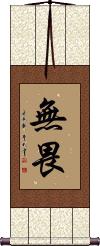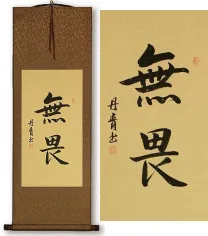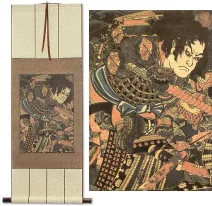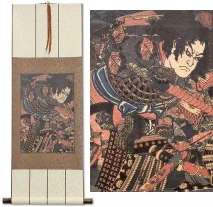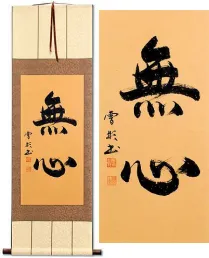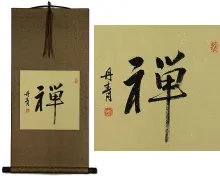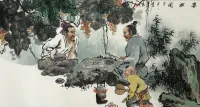Many custom options...
And formats...

No Thought in Chinese / Japanese...
Buy a No Thought calligraphy wall scroll here!
Personalize your custom “No Thought” project by clicking the button next to your favorite “No Thought” title below...
No Fear
(2 characters)
無畏 literally means “No Fear.” But perhaps not the most natural Chinese phrase (see our other “No Fear” phrase for a complete thought). However, this two-character version of “No Fear” seems to be a very popular way to translate this into Chinese when we checked Chinese Google.
Note: This also means “No Fear” in Japanese and Korean, but this character pair is not often used in Japan or Korea.
This term appears in various Chinese dictionaries with definitions like “without fear,” intrepidity, fearless, dauntless, and bold.
In the Buddhist context, this is a word derived from the word Abhaya, meaning: Fearless, dauntless, secure, nothing, and nobody to fear. Also, from vīra meaning: courageous, bold.
See Also: Never Give Up | No Worries | Undaunted | Bravery | Courage | Fear No Man
Tiger Rumor
These four characters together relay the meaning that can be expressed in English as “When three people say there's a tiger running in the street, you believe it.”
Of course, there is an ancient story behind this idiom...
三人成虎 is actually a proverb that resulted from a conversation that occurred around 300 B.C.
The conversation was between the king of the Wei kingdom and one of the king's ministers named Pang Cong.
It was near the end of one of many wars, this time with the Zhao kingdom. Pang Cong was to be sent by the king to the Zhao kingdom with the king's son, who was to be held hostage. It was common at the time for a king to make his son a hostage to secure stable peace between warring kingdoms.
Before minister Pang Cong departed, he asked his king, “If one person told you a tiger was running in the street, would you believe it?.”
“No,” the king said.
The minister continued, “What if two people told you?”
The king replied, “Well, I would have my doubts but I might believe it.”
The minister continued, “So, what if three people told you that a tiger is running in the streets?”
The king replied, “Yes, I would believe it. It must be true if three people say it.”
The minister then reminded the king, “Your son and I are now traveling far away to live in the distant Zhao kingdom - much farther from your palace than the street. Rumors may fly about me in my absence, so I hope your majesty will weight such rumors appropriately.”
The king replied, “I have every trust in you, do not worry”
While the minister was gone, the king's enemies gossiped about minister Pang Cong on many occasions. At first, the king thought nothing of these comments and rumors. But slowly, as the rumors mounted, the king began to suspect ill of his minister.
Sometime later, when peace was well-established, the minister and prince were freed and returned to the kingdom of Wei. The king received his son BUT DID NOT EVEN SUMMON MINISTER PANG CONG TO THE PALACE!
Hopefully, this story will help you see how dangerous words can be when used to promote rumors or create ill will. And perhaps will inspire you not to believe everything you hear.
There is also a secondary suggestion in this idiom that gossip is as ferocious as a tiger. Some Chinese people who don't know the ancient story above may believe that this scroll means that rumors are as vicious as three tigers.
Note: This proverb appears in my Korean dictionary but is not well-known in Korea.
Better Late Than Never
It's Never Too Late Too Mend
Long ago in what is now China, there were many kingdoms throughout the land. This time period is known as “The Warring States Period” by historians because these kingdoms often did not get along with each other.
Sometime around 279 B.C. the Kingdom of Chu was a large but not particularly powerful kingdom. Part of the reason it lacked power was the fact that the King was surrounded by “yes men” who told him only what he wanted to hear. Many of the King's court officials were corrupt and incompetent which did not help the situation.
The King was not blameless himself, as he started spending much of his time being entertained by his many concubines.
One of the King's ministers, Zhuang Xin, saw problems on the horizon for the Kingdom, and warned the King, “Your Majesty, you are surrounded by people who tell you what you want to hear. They tell you things to make you happy and cause you to ignore important state affairs. If this is allowed to continue, the Kingdom of Chu will surely perish, and fall into ruins.”
This enraged the King who scolded Zhuang Xin for insulting the country and accused him of trying to create resentment among the people. Zhuang Xin explained, “I dare not curse the Kingdom of Chu but I feel that we face great danger in the future because of the current situation.” The King was simply not impressed with Zhuang Xin's words.
Seeing the King's displeasure with him and the King's fondness for his court of corrupt officials, Zhuang Xin asked permission from the King that he may take leave of the Kingdom of Chu, and travel to the State of Zhao to live. The King agreed, and Zhuang Xin left the Kingdom of Chu, perhaps forever.
Five months later, troops from the neighboring Kingdom of Qin invaded Chu, taking a huge tract of land. The King of Chu went into exile, and it appeared that soon, the Kingdom of Chu would no longer exist.
The King of Chu remembered the words of Zhuang Xin and sent some of his men to find him. Immediately, Zhuang Xin returned to meet the King. The first question asked by the King was “What can I do now?”
Zhuang Xin told the King this story:
A shepherd woke one morning to find a sheep missing. Looking at the pen saw a hole in the fence where a wolf had come through to steal one of his sheep. His friends told him that he had best fix the hole at once. But the Shepherd thought since the sheep is already gone, there is no use fixing the hole.
The next morning, another sheep was missing. And the Shepherd realized that he must mend the fence at once. Zhuang Xin then went on to make suggestions about what could be done to reclaim the land lost to the Kingdom of Qin, and reclaim the former glory and integrity of the Kingdom of Chu.
The Chinese idiom shown above came from this reply from Zhuang Xin to the King of Chu almost 2,300 years ago.
It translates roughly into English as...
“Even if you have lost some sheep, it's never too late to mend the fence.”
This proverb, 亡羊补牢犹未为晚, is often used in modern China when suggesting in a hopeful way that someone change their ways, or fix something in their life. It might be used to suggest fixing a marriage, quitting smoking, or getting back on track after taking an unfortunate path in life among other things one might fix in their life.
I suppose in the same way that we might say, “Today is the first day of the rest of your life” in our western cultures to suggest that you can always start anew.
Note: This does have Korean pronunciation but is not a well-known proverb in Korean (only Koreans familiar with ancient Chinese history would know it). Best if your audience is Chinese.
This in-stock artwork might be what you are looking for, and ships right away...
Gallery Price: $108.00
Your Price: $59.88
Gallery Price: $108.00
Your Price: $59.88
Gallery Price: $79.00
Your Price: $43.88
Gallery Price: $61.00
Your Price: $33.88
Gallery Price: $61.00
Your Price: $33.88
Gallery Price: $61.00
Your Price: $33.88
Not the results for no thought that you were looking for?
Below are some entries from our dictionary that may match your no thought search...
| Characters If shown, 2nd row is Simp. Chinese |
Pronunciation Romanization |
Simple Dictionary Definition |
三昧 see styles |
sān mèi san1 mei4 san mei sanmai; zanmai さんまい; ざんまい |
More info & calligraphy: Samadhi(1) (さんまい only) {Buddh} samadhi (state of intense concentration achieved through meditation) (san:); (suffix noun) (2) (usu. ざんまい) being immersed in; being absorbed in; indulging in; doing to one's heart's content; (suffix noun) (3) (usu. ざんまい) prone to; apt to; (given name) Sanmai (三昧地) Samādhi, "putting together, composing the mind, intent contemplation, perfect absorption, union of the meditator with the object of meditation." (M. W.) Also 三摩地 (三摩提, 三摩帝, 三摩底). Interpreted by 定 or 正定, the mind fixed and undisturbed; by 正受 correct sensation of the object contemplated; by 調直定 ordering and fixing the mind; by 正心行處 the condition when the motions of the mind are steadied and harmonized with the object; by 息慮凝心 the cessation of distraction and the fixation of the mind; by 等持 the mind held in equilibrium; by 奢摩他, i.e. 止息 to stay the breathing. It is described as concentration of the mind (upon an object). The aim is 解脫, mukti, deliverance from all the trammels of life, the bondage of the passions and reincarnations. It may pass from abstraction to ecstasy, or rapture, or trance. Dhyāna 定 represents a simpler form of contemplation; samāpatti 三摩鉢底 a stage further advanced; and samādhi the highest stage of the Buddhist equivalent for Yoga, though Yoga is considered by some as a Buddhist development differing from samādhi. The 翻譯名義 says: 思專 when the mind has been concentrated, then 志一不分 the will is undivided; when 想寂 active thought has been put to rest, then 氣虛神朗 the material becomes etherealized and the spirit liberated, on which 智 knowledge, or the power to know, has free course, and there is no mystery into which it cannot probe. Cf. 智度論 5, 20, 23, 28; 止觀 2; 大乘義章 2, 9, 1 3, 20, etc. There are numerous kinds and degrees of samādhi. |
無心 无心 see styles |
wú xīn wu2 xin1 wu hsin mushin むしん |
More info & calligraphy: No Mind / Mushin(n,adj-no,adj-na) (1) innocence; (noun - becomes adjective with の) (2) {Buddh} (See 有心・2) mind free of obstructive thoughts; detachment; no-mind; (adj-no,n) (3) insentient; (noun, transitive verb) (4) pestering (someone for money, etc.); asking; begging; request Mindless, without thought, will, or purpose; the real immaterial mind free from illusion; unconsciousness, or effortless action. |
伏 see styles |
fú fu2 fu fuse ふせ |
to lean over; to fall (go down); to hide (in ambush); to conceal oneself; to lie low; hottest days of summer; to submit; to concede defeat; to overcome; to subdue; volt (surname) Fuse Prostrate; humble; suffer, bear; ambush; dog-days; hatch; it is used for control, under control, e. g. as delusion; 斷 is contrasted with it as complete extirpation, so that no delusive thought arises. |
一意 see styles |
yī yì yi1 yi4 i i ichii / ichi いちい |
focus; with complete devotion; stubbornly (1) one meaning; one thought; (adverb) (2) (See 一意専心) wholeheartedly; single-mindedly; devotedly; (adj-no,adj-na) (3) {comp} unique; (personal name) Hitoi |
二定 see styles |
èr dìng er4 ding4 erh ting nijō |
two kinds of [no-thought] absorption |
四宗 see styles |
sì zōng si4 zong1 ssu tsung shishū |
The four kinds of inference in logic— common, prejudged or opposing, insufficiently founded, arbitrary. Also, the four schools of thought I. According to 淨影 Jingying they are (1) 立性宗 that everything exists, or has its own nature; e. g. Sarvāstivāda, in the 'lower' schools of Hīnayāna; (2) 破性宗 that everything has not a nature of its own; e. g. the 成實宗 a 'higher' Hīnayāna school, the Satyasiddhi; (3) 破相宗 that form has no reality, because of the doctrine of the void, 'lower' Mahāyāna; (4) 願實宗 revelation of reality, that all comes from the bhūtatathatā, 'higher ' Mahāyāna. II. According to 曇隱 Tanyin of the 大衍 monastery they are (1) 因緣宗, i. e. 立性宗 all things are causally produced; (2) 假名宗, i. e. 破性宗 things are but names; (3) 不眞宗, i. e. 破相宗, denying the reality of form, this school fails to define reality; (4) 眞宗, i. e. 顯實宗 the school of the real, in contrast with the seeming. |
四禪 四禅 see styles |
sì chán si4 chan2 ssu ch`an ssu chan shizen |
(四禪天) The four dhyāna heavens, 四靜慮 (四靜慮天), i. e. the division of the eighteen brahmalokas into four dhyānas: the disciple attains to one of these heavens according to the dhyāna he observes: (1) 初禪天 The first region, 'as large as one whole universe' comprises the three heavens, Brahma-pāriṣadya, Brahma-purohita, and Mahābrahma, 梵輔, 梵衆, and 大梵天; the inhabitants are without gustatory or olfactory organs, not needing food, but possess the other four of the six organs. (2) 二禪天 The second region, equal to 'a small chiliocosmos' 小千界, comprises the three heavens, according to Eitel, 'Parīttābha, Apramāṇābha, and Ābhāsvara, ' i. e. 少光 minor light, 無量光 infinite light, and 極光淨 utmost light purity; the inhabitants have ceased to require the five physical organs, possessing only the organ of mind. (3) 三禪天 The third region, equal to 'a middling chiliocosmos '中千界, comprises three heavens; Eitel gives them as Parīttaśubha, Apramāṇaśubha, and Śubhakṛtsna, i. e. 少淨 minor purity, 無量淨 infinite purity, and 徧淨 universal purity; the inhabitants still have the organ of mind and are receptive of great joy. (4) 四禪天 The fourth region, equal to a great chiliocosmos, 大千界, comprises the remaining nine brahmalokas, namely, Puṇyaprasava, Anabhraka, Bṛhatphala, Asañjñisattva, Avṛha, Atapa, Sudṛśa, Sudarśana, and Akaniṣṭha (Eitel). The Chinese titles are 福生 felicitous birth, 無雲 cloudless, 廣果 large fruitage, 無煩 no vexations, atapa is 無熱 no heat, sudṛśa is 善見 beautiful to see, sudarśana is 善現 beautiful appearing, two others are 色究竟 the end of form, and 無想天 the heaven above thought, but it is difficult to trace avṛha and akaniṣṭha; the inhabitants of this fourth region still have mind. The number of the dhyāna heavens differs; the Sarvāstivādins say 16, the 經 or Sutra school 17, and the Sthavirāḥ school 18. Eitel points out that the first dhyāna has one world with one moon, one mem, four continents, and six devalokas; the second dhyāna has 1, 000 times the worlds of the first; the third has 1, 000 times the worlds of the second; the fourth dhyāna has 1, 000 times those of the third. Within a kalpa of destruction 壞劫 the first is destroyed fifty-six times by fire, the second seven by water, the third once by wind, the fourth 'corresponding to a state of absolute indifference' remains 'untouched' by all the other evolutions; when 'fate (天命) comes to an end then the fourth dhyāna may come to an end too, but not sooner'. |
寂寞 see styles |
jì mò ji4 mo4 chi mo jakubaku せきばく |
lonely; lonesome; (of a place) quiet; silent (1) loneliness; desolation; (adj-t,adv-to,adj-no) (2) lonely; lonesome; dreary; desolate; deserted; (3) harsh (words); cutting (criticism); (noun or participle which takes the aux. verb suru) (4) to separate in thought; to consider as independent quiescent |
寂莫 see styles |
sekibaku せきばく jakumaku じゃくまく |
(irregular kanji usage) (1) loneliness; desolation; (adj-t,adv-to,adj-no) (2) lonely; lonesome; dreary; desolate; deserted; (3) harsh (words); cutting (criticism); (noun or participle which takes the aux. verb suru) (4) to separate in thought; to consider as independent |
尸羅 尸罗 see styles |
shī luó shi1 luo2 shih lo shira |
sila (Buddhism) Sila, 尸; 尸怛羅 intp. by 淸凉 pure and cool, i.e. chaste; also by 戒 restraint, or keeping the commandments; also by 性善 of good disposition. It is the second pāramitā, moral purity, i. e. of thought, word, and deed. The four conditions of śīla are chaste, calm, quiet, extinguished, i. e. no longer perturbed by the passions. Also, perhaps śīla, a stone, i. e. a precious stone, pearl, or coral. For the ten śīlas or commandments v. 十戒, the first five, or pañca-śīla 五戒, are for all Buddhists. |
思考 see styles |
sī kǎo si1 kao3 ssu k`ao ssu kao shikou / shiko しこう |
to reflect on; to ponder over (n,vs,vt,vi,adj-no) thought; consideration; thinking |
本流 see styles |
honryuu / honryu ほんりゅう |
(1) main course (of a river); (noun - becomes adjective with の) (2) mainstream; main current (e.g. of thought); (place-name) Honryū |
法性 see styles |
fǎ xìng fa3 xing4 fa hsing hosshou; houshou / hossho; hosho ほっしょう; ほうしょう |
{Buddh} (See 法相・ほっそう・1) dharmata (dharma nature, the true nature of all manifest phenomena); (personal name) Hosshou dharmatā. Dharma-nature, the nature underlying all thing, the bhūtatathatā, a Mahāyāna philosophical concept unknown in Hīnayāna, v. 眞如 and its various definitions in the 法相, 三論 (or法性), 華嚴, and 天台 Schools. It is discussed both in its absolute and relative senses, or static and dynamic. In the Mahāparinirvāṇa sūtra and various śāstras the term has numerous alternative forms, which may be taken as definitions, i. e. 法定 inherent dharma, or Buddha-nature; 法住 abiding dharma-nature; 法界 dharmakṣetra, realm of dharma; 法身 dharmakāya, embodiment of dharma; 實際 region of reality; 實相 reality; 空性 nature of the Void, i. e. immaterial nature; 佛性 Buddha-nature; 無相 appearance of nothingness, or immateriality; 眞如 bhūtatathatā; 如來藏 tathāgatagarbha; 平等性 universal nature; 離生性 immortal nature; 無我性 impersonal nature; 虛定界: realm of abstraction; 不虛妄性 nature of no illusion; 不變異性 immutable nature; 不思議界 realm beyond thought; 自性淸淨心 mind of absolute purity, or unsulliedness, etc. Of these the terms 眞如, 法性, and 實際 are most used by the Prajñāpāramitā sūtras. |
無念 无念 see styles |
wú niàn wu2 nian4 wu nien munen むねん |
(n,adj-na,adj-no) (1) regret; chagrin; mortification; (2) {Buddh} (See 有念) freedom from obstructive thoughts Without a thought; without recollection; absence of false ideas or thoughts, i.e. correct ideas or thoughts; apart from thought (nothing exists). |
無意 无意 see styles |
wú yì wu2 yi4 wu i mui むい |
inadvertent; accidental; to have no intention of (doing something) unintentional Absence of objective thought, of will or intention; absence of idea, the highest stage of dhyāna. |
無派 see styles |
muha むは |
belonging to no party or school of thought |
非想 see styles |
fēi xiǎng fei1 xiang3 fei hsiang |
Beyond the condition of thinking or not-thinking, of active consciousness or unconsciousness; an abbrev. for 非想非非想天 or 非想非非想處. |
一念頃 一念顷 see styles |
yī niàn qǐng yi1 nian4 qing3 i nien ch`ing i nien ching ichinen no aida |
instant of thought |
入無想 入无想 see styles |
rù wú xiǎng ru4 wu2 xiang3 ju wu hsiang nyū musō |
attaining [the] no-thought [concentration] |
八解脫 八解脱 see styles |
bā jiě tuō ba1 jie3 tuo1 pa chieh t`o pa chieh to hachi gedatsu |
aṣṭa-vimokṣa, mokṣa, vimukti, mukti. Liberation, deliverance, freedom, emancipation, escape, release―in eight forms; also 八背捨 and cf. 解脫 and 八勝處. The eight are stages of mental concentration: (1) 内有色想觀外色解脱 Liberation, when subjective desire arises, by examination of the object, or of all things and realization of their filthiness. (2) 内無色想觀外色解脫 Liberation, when no subjective desire arises, by still meditating as above. These two are deliverance by meditation on impurity, the next on purity. (3) 淨身作證具足住解脫 Liberation by concentration on the pure to the realization of a permanent state of freedom from all desire. The above three "correspond to the four Dhyānas". (Eitel.) (4) 空無邊處解脫 Liberation in realization of the infinity of space, or the immaterial. (5) 識無邊處解脫 Liberation in realization of infinite knowledge. (6) 無所有處解脫Liberation in realization of nothingness, or nowhereness. (7) 非想非非想處解脫 Liberation in the state of mind where there is neither thought nor absence of thought. These four arise out of abstract meditation in regard to desire and form, and are associated with the 四空天. (8) 滅受 想定解脫 Liberation by means of a state of mind in which there is final extinction, nirvāṇa, of both sensation, vedanā, and consciousness, saṁjñā. |
四念處 四念处 see styles |
sì niàn chù si4 nian4 chu4 ssu nien ch`u ssu nien chu shinenjo |
Four objects on which memory or the thought should dwell— the impurity of the body, that all sensations lead to suffering, that mind is impermanent, and that there is no such thing as an ego. There are other categories for thought or meditation.; (四念處觀); 四念住 smṛtyupasthāna. The fourfold stage of mindfulness, thought, or meditation that follows the 五停心觀 five-fold procedure for quieting the mind. This fourfold method, or objectivity of thought, is for stimulating the mind in ethical wisdom. It consists of contemplating (1) 身 the body as impure and utterly filthy; (2) 受 sensation, or consciousness, as always resulting in suffering; (3) 心 mind as impermanent, merely one sensation after another; (4) 法 things in general as being dependent and without a nature of their own. The four negate the ideas of permanence, joy, personality, and purity 常, 樂, 我, and 淨, i. e. the four 顚倒, but v. 四德. They are further subdivided into 別 and 總 particular and general, termed 別相念處 and 總相念處, and there are further subdivisions. |
掠める see styles |
kasumeru かすめる |
(transitive verb) (1) (kana only) to steal; to rob; to snatch; to pocket; to plunder; (transitive verb) (2) (kana only) to deceive; to trick; to cheat; (transitive verb) (3) (kana only) to graze (in passing); to skim; to brush against; to touch lightly; (transitive verb) (4) (kana only) to appear and quickly disappear (a thought, a smile, etc.); to flit (through one's mind, across one's face); (transitive verb) (5) (kana only) (often as 目をかすめて) to do (something) while no one is looking; (transitive verb) (6) (kana only) (archaism) to hint at; to suggest; to insinuate |
無心地 无心地 see styles |
wú xīn dì wu2 xin1 di4 wu hsin ti mushin chi |
state of no-thought |
無想天 无想天 see styles |
wú xiǎng tiān wu2 xiang3 tian1 wu hsiang t`ien wu hsiang tien musō ten |
無想界; 無想處 avṛha, the thirteenth brahmaloka, the fourth in the fourth dhyāna, where thinking, or the necessity for thought, ceases. |
無想果 无想果 see styles |
wú xiǎng guǒ wu2 xiang3 guo3 wu hsiang kuo musō ka |
realization gained by no-thought meditation |
非想天 see styles |
fēi xiǎng tiān fei1 xiang3 tian1 fei hsiang t`ien fei hsiang tien |
neither thought nor no-thought heaven |
非想定 see styles |
fēi xiǎng dìng fei1 xiang3 ding4 fei hsiang ting |
concentration of no thought |
と思うと see styles |
toomouto / toomoto とおもうと |
(expression) (1) (after past tense verb) no sooner than; as soon as; immediately after; (expression) (2) at the thought of; when I think about |
一念之頃 一念之顷 see styles |
yī niàn zhī kuǐ yi1 nian4 zhi1 kui3 i nien chih k`uei i nien chih kuei ichinen no kei |
instant of a single thought-moment |
一念萬年 一念万年 see styles |
yī niàn wàn nián yi1 nian4 wan4 nian2 i nien wan nien ichinen bannen |
In a moment's thought to obtain a myriad years and no return to mortality. |
Click here for more no thought results from our dictionary
The following table may be helpful for those studying Chinese or Japanese...
| Title | Characters | Romaji (Romanized Japanese) | Various forms of Romanized Chinese | |
| No Fear | 無畏 无畏 | mui | wú wèi / wu2 wei4 / wu wei / wuwei | |
| Tiger Rumor | 三人成虎 | sān rén chéng hǔ san1 ren2 cheng2 hu3 san ren cheng hu sanrenchenghu | san jen ch`eng hu sanjenchenghu san jen cheng hu |
|
| Better Late Than Never | 亡羊補牢猶未為晚 亡羊补牢犹未为晚 | wáng yáng bǔ láo yóu wèi wéi wǎn wang2 yang2 bu3 lao2 you2 wei4 wei2 wan3 wang yang bu lao you wei wei wan | wang yang pu lao yu wei wei wan wangyangpulaoyuweiweiwan |
|
| In some entries above you will see that characters have different versions above and below a line. In these cases, the characters above the line are Traditional Chinese, while the ones below are Simplified Chinese. | ||||
Successful Chinese Character and Japanese Kanji calligraphy searches within the last few hours...
